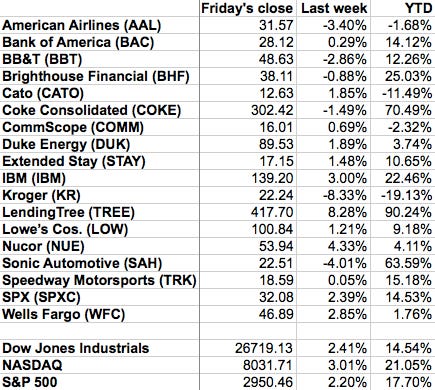How Charlotte has changed in 8 years
Plus: Investors snatch up Charlotte houses; N.C. sports gambling could pass this week; GE 'smart' light bulb not all that smart
Good morning! Today is Monday, June 24, 2019.
Need to subscribe? Sign up for free here (charlotteledger.substack.com).
Guest column: I left Charlotte 8 years ago and just returned for the first time. Here’s what’s different.
by Jeff Elder
Way back in 2011, I left Charlotte after years as an Observer copy editor and columnist for a new gig on the West Coast. This month, I returned and experienced the city for the first time since leaving, plunging into crowded Tryon Street for the Taste of Charlotte festival. What’s changed? What hasn’t? What should?
Read on, Charlotteans.
What’s changed:
Amelie’s: There are how many Amelie’s? When I lived here there was one — and it was funky and hip and in a weird location, and that made it even better. Now, there are kitchen utensil chandeliers and salted caramel brownies everywhere.
Skyline: There’s a lovely little ballpark with a lovely big skyline behind it. I used to drive to Fort Mill to visit Homer the Dragon and the Knights. Now, people mosey over to the very chill and friendly BB&T Ballpark.
Internationalism: A tech worker from Liberia stopped by our tent at Taste of Charlotte and used free VPN licenses to help people back home get around the government’s social media shutdown. Global innovation to protest censorship in the streets of Uptown? Impressive.

Charlotte’s ever-changing skyline is one of the most evident differences, columnist Jeff Elder writes. The new Legacy Union building is on the left in purple.
What hasn’t:
Food: Mert’s Heart and Soul still has the mouth-watering catfish, weighty cornbread and toothachey sweet tea you come home to. You should have seen my European guests’ eyes when they took their first bites. Charlotte remains a daaaaang good eating city.
Neighborhoods: The mighty oaks of Dilworth stand proud against thrashing thunderstorms while kids take shelter on wraparound front porches. This is one of the great urban neighborhoods in the country. It’s as quintessentially Southern as “To Kill A Mockingbird” — but with a handsome skyline behind it.
Charlotte nice: People talk to you in elevators. You thank the waitress three times for a refill of coffee. Everyone wants to hold the door for everyone else. Even if passive-aggressive whispering commences as soon as someone’s back is turned, the Queen City is the most polite big city I know.
What should:
Self-perception: Charlotte is not a soulless New South city, Atlanta Jr., or confuse-able with Charleston and Charlottesville. People know Charlotte. You don’t have to apologize or explain how you’re not ready for prime time. You’re the go-go city that made a heroic comeback from the recession! Own it.
Attire: Dudes, there are pants other than khakis and shirts other than candy-assed golf shirts. Branch out! Some of the women folk now have little nose rings (tiny little studs, anyway). Surely you can shake up that ensemble.
Scooters: Swizzle stick scooters whiz past pedestrians and litter sidewalks like discarded toothpicks at the cheese-tasting tent. Annoying as mosquitoes and seemingly fueled by mojitos, these things have been banned by other cities for their alarming propensity to fling riders from carefree hijinks into traction. Dump them.
Jeff Elder wrote the Glad You Asked and Insider columns for The Charlotte Observer from 2002-2010. He now lives in San Francisco, where they think barbecue is a verb you do to tofu and Brussels sprouts.
New housing stats: Investors buy 1 in every 7 Charlotte homes, above national average
The number of homes sold to investors reached an all-time high in 2018, according to figures released late last week — and the share of homes in the Charlotte area sold to people who aren’t planning to live there is above the national average.
Why it matters: The report last week from CoreLogic showed that 11% of homes nationally were sold to investors. That’s an all-time high — higher than even before the recession of 2008-09. It’s potentially worrisome because people who buy houses to rent them out or flip them can crowd out first-time homebuyers and make housing more expensive.
Here’s why the rate is rising, according to a front-page article (paywall) in Friday’s Wall Street Journal:
Strong rental demand, technology that facilitates buying homes online and low interest rates that make other investments less appealing have fueled investor appetite.
Investors are an especially powerful force at the bottom of the market, where they often pay all cash. Investors purchased one in five homes in the bottom third price range in 2018, according to the CoreLogic analysis, up 5 percentage points from the 20-year average of less than 15%.
“These are the homes that first-time home buyers would logically be buying,” said Ralph McLaughlin, deputy chief economist at CoreLogic.
The housing markets with the most investor purchases as a share of sales were Detroit (27%), Philadelphia (23.3%) and Memphis (19.7%).
Charlotte figures: Of the top 100 metro areas, Charlotte was #18, with 15.1% of its houses purchased by investors in 2018. Of the lowest-priced homes in the Charlotte area, investor purchases accounted for 25% of sales. (Full dataset available in link at the bottom of this page.)
It’s a trend to keep an eye on, especially locally, since civic and political leaders here have identified the shortage of affordable housing as a crisis demanding more attention (and money). Even if local affordable housing is in “crisis,” it’s not one that Charlotte alone is battling. Figures show that Charlotte is pretty typical among big cities in the cost of housing when compared with income:
Of the 100 biggest cities in the U.S., Charlotte was in the middle third, or #36, in the percentage of income needed to buy a house, according to the May 2019 RealtyHop Housing Affordability Index. The typical Charlotte home-buyer would need to spend about 36% of income to buy the average Charlotte house. Financial experts recommend spending no more than 30%.
Even if you look at rentals, not home ownership, Charlotte is pretty normal. The city is not in the top 20 worst cities for renters among the 50 biggest metro areas, according to a Freddie Mac report from April that examined recent rental-cost studies.
Still, there’s a lot of money locally being poured into affordable housing. Between housing bonds voters approved last year and big donations from Charlotte-area companies, there’s more than $200M pledged to encourage more housing at the lower end. We’re about to find out how much government and philanthropy can move the needle in a housing market that’s big and hard to manage.
Loves me some internet: ‘Smart’ light bulbs
How many Fortune 100 companies does it take to change a light bulb?
A GE instructional video from January took off online last week, with outlets including CNBC, Gizmodo and CNN noting that it had been widely ridiculed on social media — and using it to explain why the “smart home” trend has been slow to catch on. Tip: If your light bulb requires “firmware,” you could be in trouble.


Here’s the video:
GE said in a statement:
We know technology can be complicated and are aware that our current factory reset process isn’t ideal. We’re finding simpler methods for our users and appreciate the patience.
Cherry residents worry about abortion protests
Residents of Charlotte’s Cherry neighborhood are circulating a letter to City Council that cites concerns about parking and anti-abortion protests near the site of the new Planned Parenthood in their community, scheduled to open in July. The letter reads in part:
This is not a ‘pro-choice’ or ‘pro-life’ issue for us. It is a quality of life issue. …
There are hundreds and periodically thousands of activists that gather at the clinic locations on a daily basis. They require HUNDREDS of parking spaces, staging areas, police presence, barricades, permits, sound equipment, signage, and a place for their giant RV. We cannot play naïve and wonder if this will happen at THIS women’s clinic. …
We are already shouldered with a disproportionate burden of intra-community work due to being a historically Black community in the midst of gentrification and integrating new public housing. We have enough on our plate.
A river runs through it
Huge water main break last night on Freedom Drive at West Morehead Street. Outbound Freedom Drive remains closed today, and repairs could take several days, the city tells WSOC. Here was the scene last night:
N.C. added jobs in May, barely
North Carolina added a slim 1,100 jobs in May, according to federal figures released Friday. Here’s the take from the brain trust at Wells Fargo’s economics group, which is based in Charlotte:
The pace of hiring has moderated, but employment growth remains solid and is up 1.5% over the year. … Monthly additions have been volatile this year but are averaging 12,000 new jobs per month through May, up slightly from an average 9,900 jobs during the same period last year.
A 3,800 decline in professional business services and 2,500 drop in leisure & hospitality held down overall job growth. Meanwhile, construction rebounded with a huge 2,000-job gain.
3,000 wait for Duke Energy to finish the job
As of Monday morning, about 3,000 Charlotte residents remained without power after Saturday’s storm. Most are in south Charlotte. Duke Energy is estimating most to have power restored by 11 p.m. tonight. Duke’s outage map as of 7 a.m.:

In brief:
Sports gambling: A bill that would legalize sports betting at Harrah’s Cherokee Casino is expected to move through the N.C. House this week, the bill’s sponsor, Sen. Jim Davis (R-Franklin), tells the Ledger. It has already passed the Senate.
Cooking oil arbitrage: Feds indict 21 people in Raleigh on conspiracy and money-laundering charges in a scheme to steal cooking oil and resell it for use in biofuels and other products. (WRAL)
UBS “Chinese pig” controversy: The Swiss banking giant is working to shore up its relationships in China after one of its economists said on a podcast, in reference to Chinese consumer prices and sickness among pigs: “Does this matter? It matters if you are a Chinese pig. It matters if you like eating pork in China.” The remark about pigs was interpreted as a reference to people. (Reuters)
Union code words: In a court filing last week, American Airlines accused its mechanics union of using code phrases to encourage slowdowns that have canceled flights. The phrases included “work safe,” “do your jobs,” and “work in accordance with all rules, regulations and manuals.” (Dallas Business Journal/paywall)
Duke’s Mayonnaise parent sold: Charlotte-based private equity firm Falfurrias Capital Partners agreed to buy the food-business assets of The C.F. Sauer Co. of Richmond, Va. (Business NC)
Taking stock
Unless you are a day trader, checking your stocks daily is unhealthy. So how about weekly? How local stocks of note fared last week (through Friday’s close), and year to date:

Got a news tip? Think we missed something? Drop me a line at editor@cltledger.com and let me know.
Like what we are doing? Feel free to forward this along and to tell a friend.
The Charlotte Ledger is an e-newsletter and web site publishing timely, informative, and interesting local business news and analysis Mondays, Wednesdays, and Fridays, except holidays and as noted. We strive for fairness and accuracy and will correct all known errors. The content reflects the independent editorial judgment of The Charlotte Ledger. Any advertising, paid marketing, or sponsored content will be clearly labeled.
The Charlotte Ledger is published by Tony Mecia, an award-winning former Charlotte Observer business reporter and editor. He lives in Charlotte with his wife and three children.








